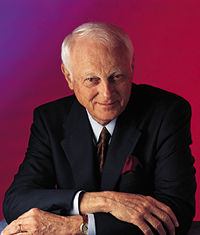

1. Reform the state's absentee ballot system.
"This idea is close to home. In the state of Washington, I believe we have an absentee ballot system that is an embarrassment. Now we permit voters to send in absentee ballots on the day of the election. We need to change the system to require them to arrive by the day of the election. As they arrive, they should be counted so that as the polls close, we would have 90 percent of the total counted.
"This is a problem that reached its height in the Gorton-Cantwell election for U.S. Senate. Not only is it unfair to the candidates, but it played a minor role in the pageant we just went through with the presidential election, since no one knew if the Senate would be split 50-50 or not. It was an embarrassment."
2. Modernize how voters vote.
"I know this is the cliché of the week, but what was unearthed in Florida was simply ridiculous. There are many ways to avoid having chads and dimpled ballots. It's time to throw out the old fashioned systems and have a new one. As far as Internet voting, unless I can be assured it can't be tampered with by hackers, I'd be leery of that. There may be a technological alternative to the Internet. It would also be a good idea to have a uniform ballot system across the United States, but it might be hard to accomplish since there would be so many objections on states-rights grounds."
3. Establish a closed primary for Washington state.
"A recent U.S. Supreme Court decision banned blanket primary systems where voters can cross over the ballot in primaries and vote for whomever they want. I agree with that. I am hoping that the state of Washington will establish a 'closed primary,' where the voter registers as a Republican or a Democrat or a Green or a Libertarian for the primary. Of course, you don't have to register in the general election.
"There is something called an 'open primary' where you don't register, but each time you vote in a primary, you ask for a specific ballot, such as the Democratic ballot or the Republican ballot. But the closed primary is the best. People with strong partisan opinions ought to be able to select the candidates for their parties. I'm a strong advocate of political parties. This would strengthen them."
4. Applaud partisanship.
"A lot of pundits and people are saying that the 50-50 election is a mandate for bipartisanship. It is no such thing. It is a reflection of a sharply and evenly divided electorate, not a call for bipartisanship. This election is a reflection of acute partisanship, and that's a good thing. And I don't mean the bitterness and the hostilities and the unwillingness to compromise when I talk about partisanship. Partisanship is a good thing. Voters ought to go into a voting booth and express themselves on a whole range of issues. A partisan divide is not bad, it's good. It reflects the honest opinions of a free people."
5. Reform the initiative process.
"The initiative process has become an abomination. It is a classic illustration of the unanticipated consequences of reform. The Progressives brought it in 100 years ago as a response to state legislatures and Congress in the hip pockets of moneyed interests.
"Today it is taken to its extremes in places like California, Oregon and Washington and it is seriously undermining representative government. The Tim Eymans of the world are responsible to no one. They don't have to live with the consequences of their actions. How to balance the budget or fix the potholes, that is not their problem. They are not accountable.
The legislators and the governor are accountable. If we don't like what they are doing, we throw them out of office. I am a strong advocate of representative democracy, not direct democracy. So I would make it much harder to get initiatives on the ballot. It should take twice the number of signatures it does today."
What the future holds:
"I'm afraid nothing will happen with initiatives. And I think Washington state will get the open primary, not the closed primary that I feel is better. I do feel that Florida and a lot of places will clean up their act after this debacle. As for changing absentee ballots in our state, it won't happen. Legislators have told me that tampering with absentee ballots is like the third rail on a subway system—no one will touch it.
"I don't think political parties will get weaker. They are an essential factor in our political system."
|
President Emeritus William P. Gerberding served as the head of the UW from 1979 to 1995. What students of that era may not recall is that he started his academic career in political science, earning a Ph.D. at the University of Chicago in 1959. Gerberding then was a congressional fellow and worked on the staffs of Sen. Eugene McCarthy (D-Minn.) and Rep. Frank Thompson, Jr (D-N.J.). He was on the political science faculty at UCLA for 11 years, the last two as chair of the department. Since his retirement, Gerberding has been active on many corporate and non-profit boards, including the board that oversaw the construction of Safeco Field. He also serves as the chair of a roundtable on clinical research scientists for the National Academy of Sciences/Institute of Medicine, which involves representatives of drug companies, other business leaders, faculty, university administrators and government officials. "So I'm back to herding cats again," he says.